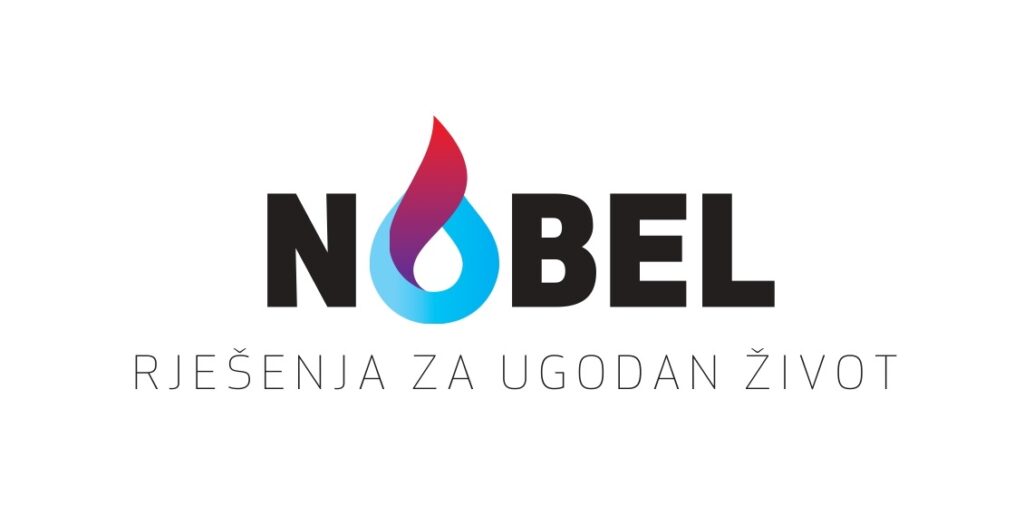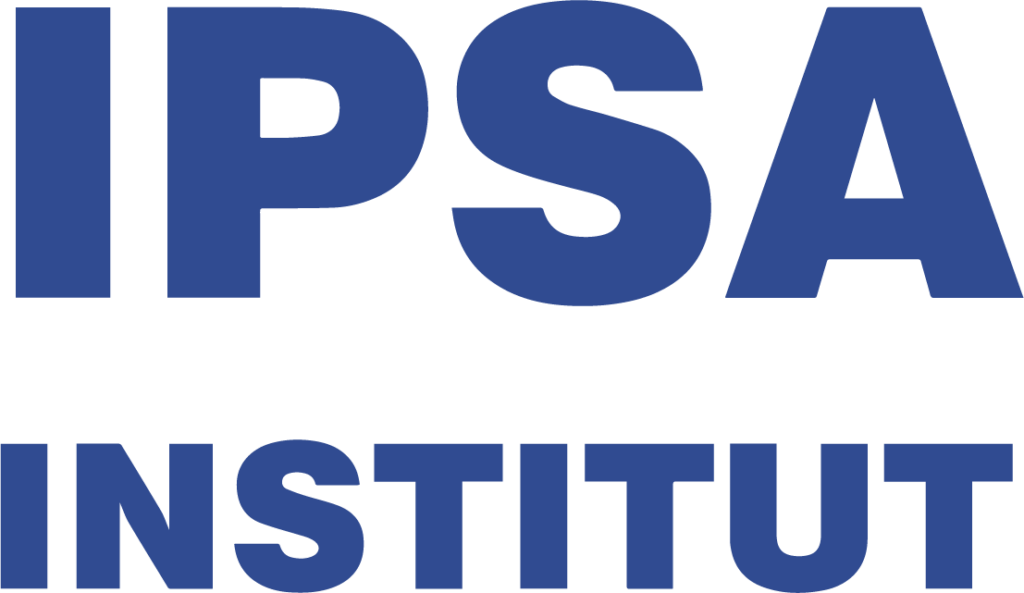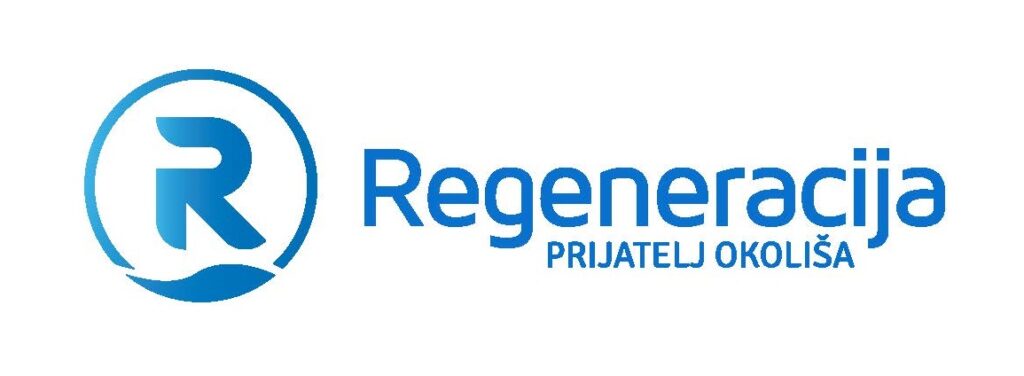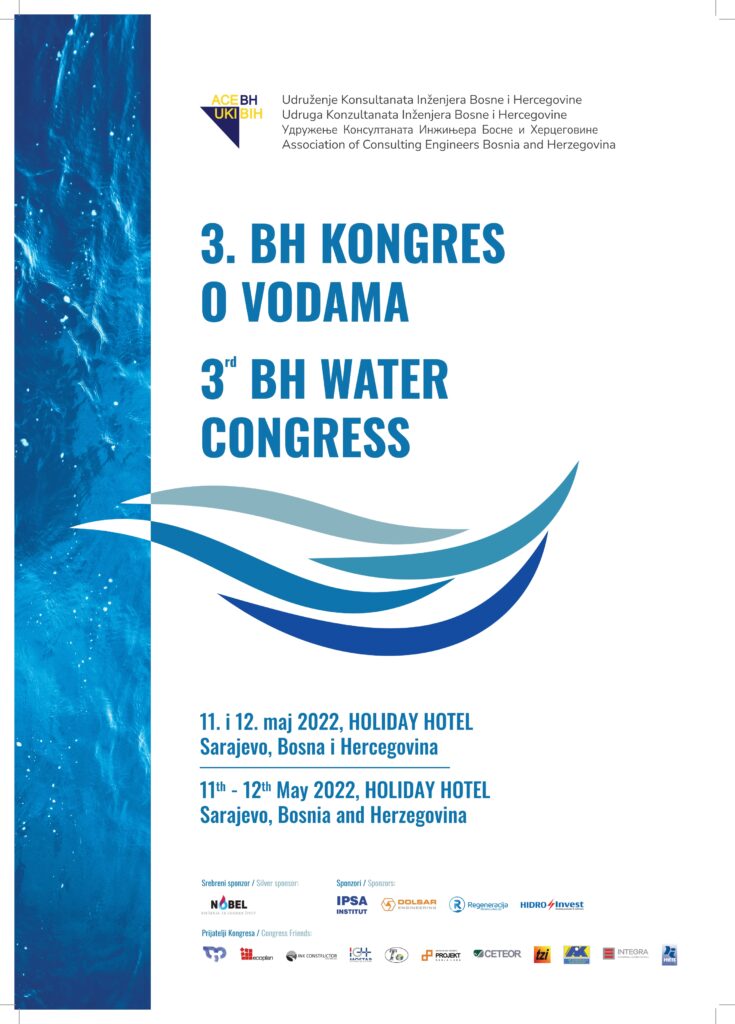11. i 12. maj 2022., Sarajevo
Vode u BiH, gdje ste?
Ili male, opterećene otpadnim vodama i smećem, ili velike, razlivene na sve strane!
Ovaj odgovor „Voda“ na pitanje „Gdje ste“ je moto 3. BiH Kongresa o vodama.
Dakle, riječ je „borbi protiv zagađivanja voda“, kako se to u EU Zelenoj Agendi za Zapadni Balkan navodi, znači zaštiti voda u kontekstu globalnih promjena klime, koncentracije stanovništva u gradovima, industrijalizacije i gradnje infrastrukture, te promjena korištenja zemljišta, uključujući isušivanje močvara. Borba protiv klimatskih promjena je svjetski okolišni, ekonomski i politički problem, u kome BiH aktivno učestvuje. Međutim, prilagođavanje na klimatske promjene je pretežno lokalni problem, prije svega u odgovoru na promjene režima voda – dugotrajnijih malovodnih perioda i suša, te sve razornijih i češćih poplava.
EU vodna politika je fokusirana na zaštitu vodnih resursa. Cilj je postići dobar ekološki status i omogućiti održivo korištenje voda. Bez adekvatne zaštite, korištenje voda je, kao što znamo, preskupo ili čak nemoguće.
Sektor upravljanja vodama u BiH je postigao značajne rezultate u reguliranju ove oblasti. Reforme su započete još krajem 90-tih godina prošlog vijeka, u skladu sa EU politikama, uz podršku tadašnjih EU programa. Upravljanje vodama u BiH odvija se u okviru prirodnih jedinica – riječnih bazena/vodnih područja Save i Jadrana. Entitetski zakoni doneseni 2006. godine transponiraju najznačajnije odredbe EU Okvirne direktive o vodama (2000/60/EC) iz 2000. godine. Po osnovu ovih zakona, u entitetima su izrađene entitetske Strategije upravljanja vodama. Sastavni dio Strategija predstavljaju ciljevi i relevantne mjere, koje se odnose na institucionalni, pravni i ekonomski aspekt upravljanja vodama, koji bi trebali omogućiti da se dostizanje ciljeva odvija ubrzano, efikasno i na principima održivosti. Entiteti su izradili prvi, a radi se i drugi šestogodišnji ciklus Planova upravljanja vodama, (za periode 2016 – 2021 i 2022 – 2027), koji predstavljaju glavni instrument obezbjeđenja dobrog stanja površinskih i podzemnih voda. Međutim, njihova realizacija zahtijeva značajno povećanje naših kapaciteta, institucionalne napore i finansijska sredstva. U Brčko Distriktu BiH je takođe izrađen Plan upravljanja vodama za vodno područja rijeke Save u Brčko Distriktu, prvi ciklus.
Iz perspektive interesa građana i evropskih integracija, upravljanje vodama predstavlja zaista složeno pitanje, jer su uspostavljena tri vodna područja rijeke Save (pod ingerencijom FBiH, RS i BD), kao dijela međunarodnih slivova Save i Dunava, i još dva vodna područja međunarodnog sliva Jadranskog mora (FBiH i RS). Riječni bazeni jesu i normativno i u BiH praksi osnovne jedinice u upravljanju vodama, ali su u BiH potrebne potpuno jasne procedure, da bi sve relevantne institucije djelovale zajednički i koordinirano.
Značajni pomaci su učinjeni na jačanju kompetentnosti za realizaciju Strategija i Planova upravljanja. Ipak, proces jačanja institucija i kapaciteta, ključan za napredak u upravljanju vodama u BiH, najčešće je finansijski podržavan od međunarodnih institucija, jer je sektor voda suočen sa izuzetno ograničenim finansiranjem iz domaćih, vlastitih izvora. Naročita podkapacitiranost je prisutna na nižim novima vlasti, u kantonima u FBiH i općinama, koji nose najveću odgovornost za sektor vodnih usluga, koji uključuje snabdijevanje vodom stanovništva i privrede, te odvodnju i prečišćavanje otpadnih voda.
Najveći finansijski zahtjevi provedbe EU zakonodavstva za sektor okoliša predstavljaju provedbe “visoko investicionih” direktiva, a to su Direktiva o odvodnji i prečišćavanju urbanih otpadnih voda (91/271/EEC), Direktive o vodi za piće (98/83/EC i 79/869/EEC) i Direktiva o procjeni i upravljanju rizicima od poplava (2007/60/EZ). Usvajanjem “Strategije usklađivanja propisa pravnoj stečevini EU u oblasti zaštite životne sredine BiH (EAS)” 2017. godine, otvorile su se nove mogućnosti unaprjeđenja sektora voda u BiH i dostizanje ciljeva usklađenih sa EU legislativom, standardima i praksama. Prema ovoj strategiji, puna aproksimacija direktiva iz oblasti voda se očekuje 2033. godine. U strategiji su procijenjeni troškovi aproksimacije za sektor voda na 3,8 milijardi €, odnosno 55% od ukupnog troška aproksimacije svih podsektora okoliša. Nakon usvajanja Strategije, nadležni organi na nivou BiH, FBiH, RS i BD izrazili su interes i započeli su sa izradom dokumenta “ESAP BiH 2030+”, koji će se sastojati od strategija i sekcionih planova i obuhvatiti sedam oblasti definisanih evropskom politikom okoliša: voda, otpad, biološka raznolikost i očuvanje prirode, kvalitet zraka, klimatske promjene i energija, hemijska sigurnost i buka, te upravljanje resursima i upravljanje okolišem, u vidu horizontalne politike. Dokumentom će biti dat integralni pregled trenutnog stanja okoliša i izazova, te desetogodišnji plan rješavanja problema.
Konferencija će, kao i prethodne, okupiti eksperte i naučne radnike iz raznih regija EU, predstavnike institucija vlasti, kao i predstvnike nevladinih organizacija.
BiH Kongres o vodama je jedinstvena prilika da se o svemu ovome razgovara, da pokušamo dati doprinos odgovoru na pitanje: „Vode u BiH, gdje ste? Kako uspješno naprijed?“
Prof. dr Tarik Kupusović
Za više informacija progledajte https://uki.ba/events/3-bih-kongres-o-vodama/
Waters in BiH, Where Are You?
The answer of “Waters” to the question of “Where are you?” is the motto of the Third BiH Congress on Waters
This is about “fighting against water pollution,” as is said in the EU's Green Agenda for Western Balkans. This means protecting waters in the context of global climate change, concentration of population in cities, industrialization, and building of infrastructure, as well as change in land use, including draining of swamps. The fight against climate change is an environmental, economic, and political problem on the global scale, and there is not much that Bosnia and Herzegovina can do about it. However, adapting to climate change is a local problem everywhere, especially in response to water regime changes — long-term periods of low water levels and droughts, as well as increasingly destructive and frequent floods.
The EU water policy focuses on protecting the water resources. The goal is to achieve good ecological status and facilitate sustainable use of waters. As we know, without adequate protection, use of waters is too expensive or even impossible.
The water management sector in BiH has achieved significant results in regulating this area. Reforms started back in the 1990s, in accordance with EU policies and with the support of then existing EU programs. Water management in Bosnia and Herzegovina is carried out within organic units — river basins/water areas of the Sava River and the Adriatic Sea. The entity laws adopted in 2006 transpose the most important provisions of the EU Framework Directive on Waters (2000/60/EC) from 2000. Based on these laws, the entities drafted the entity-level Water Management Strategies.
An integral part of the Strategies are goals and relevant measures pertaining to the institutional, legal, and economic aspects of water management, which should facilitate speedy, efficient, and sustainable achievement of goals. Each entity made the first six-year Water Management Plan for 2016-2021, and are currently drafting their second six-year plans for 2022-2027. These plans are the main instrument to ensure good condition of surface and underground waters. Their implementation, however, requires significant institutional efforts and funding. The Brčko District of BiH, too, made the first Water Management Plan for the water area of the Sava River in the Brčko District.
From the point of view of the citizens’ interest and European integration, water management is indeed a complex issue, considering that three water areas of the Sava River have been established (under jurisdiction of FBiH [Federation of Bosnia and Herzegovina], RS [Republika Srpska], and BD [Brčko District]) as part of international tributaries of Sava and Danube, as well as another two water areas (under jurisdiction of FBiH and RS) as part of international tributaries of the Adriatic Sea. Normatively and practically, the river basins in BiH are basic units in water management, but what Bosnia and Herzegovina needs is clear procedures in order for all relevant institutions to act jointly and in a coordinated fashion.
Significant progress has been made to strengthen the competencies for implementation of management strategies and plans. However, the process to strengthen the institutions and capacities, which is key for progress in water management in BiH, is in most cases financially supported by international institutions, as the water sector is faced with very limited funding from domestic sources. Lack of capacity is especially present at lower levels of government, in the FBiH's cantons and in municipalities, which carry the biggest responsibility for the water services sector, including supplying the population and the industrial sector with water, as well as drainage and wastewater treatment.
The biggest financial requirements for the implementation of EU legislation in the environmental sector are with regard to the implementation of the so-called “major investment” directives: the Urban Waste Water Treatment Directive (91/271/EEC), the Drinking Water Directive (98/83/EC and 79/869/EEC), and the Directive on the assessment and management of flood risks (2007/60/EC). The 2017 adoption of the Strategy To Align Regulation With the EU Acquis in the Area of Environmental Protection in BiH (EAS) created new opportunities to improve the water sector in BiH and achieve the goals aligned with EU legislation, standards, and practices. According to this strategy, full approximation of water directives is expected to happen in 2033. The strategy estimates the costs of water sector approximation at 3.8 billion euros, which is 55 percent of the total cost of approximation in all of the environmental sub-sectors. Following the adoption of the Strategy, the responsible authorities at the levels of Bosnia and Herzegovina, the entities, and the Brčko District expressed interest and started drafting the “ESAP BiH 2030+” document, which will consist of strategies and section plans, and comprise in the form of a horizontal policy the seven areas identified in the European environmental policy: water, waste, biodiversity and environmental preservation, air quality, climate change and energy, chemical safety and noise pollution, and management of resources and environment. This document will provide a comprehensive overview of the current situation with the environment and the challenges, as well as a ten-year plan to address issues.
As was the case with the previous conferences, this conference will gather experts and scientific workers from the wider region of Southeast Europe and EU, government officials, and nongovernmental organizations.
The Third Congress on Waters provides us with a unique opportunity to try and give a contribution to the efforts to answer the question of “Waters in BiH, where are you? How do we move forward with success?”
Chairman of the Board of the 3rd BH Water Congress Prof.dr. Tarik Kupusović
More information:
SPONZORI / SPONSORS:
SREBRENI SPONZOR:

SPONZORI:





